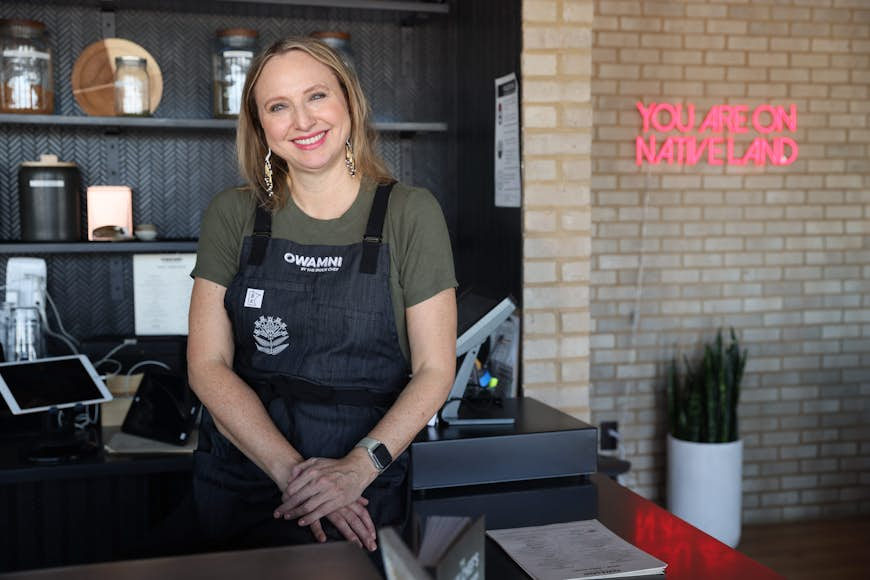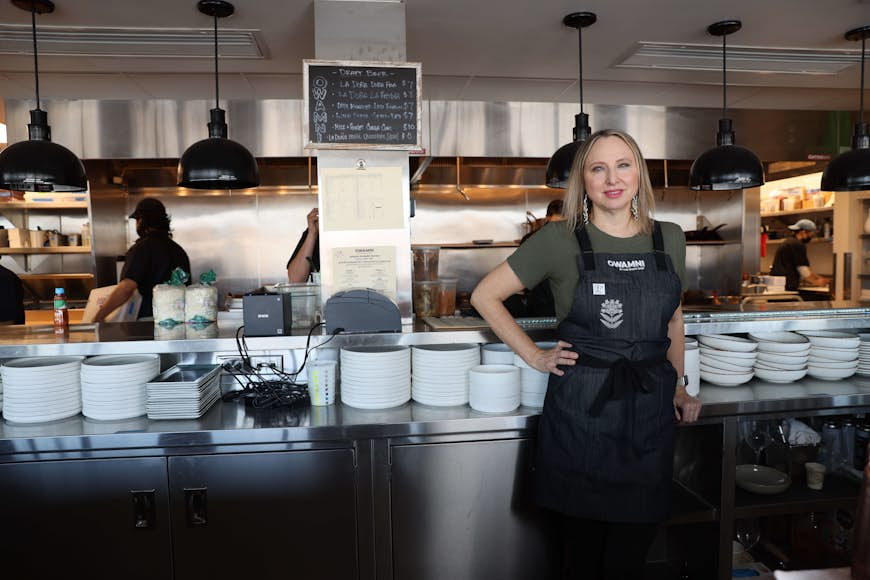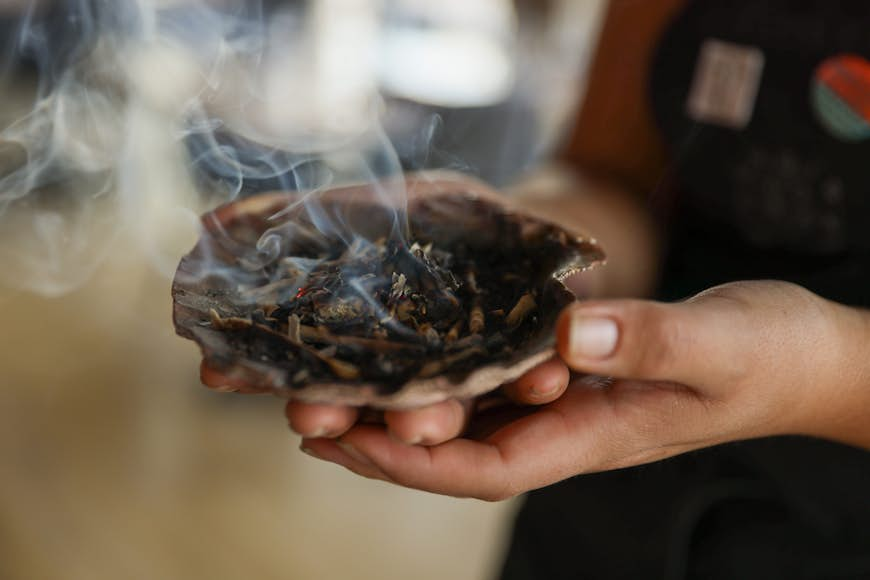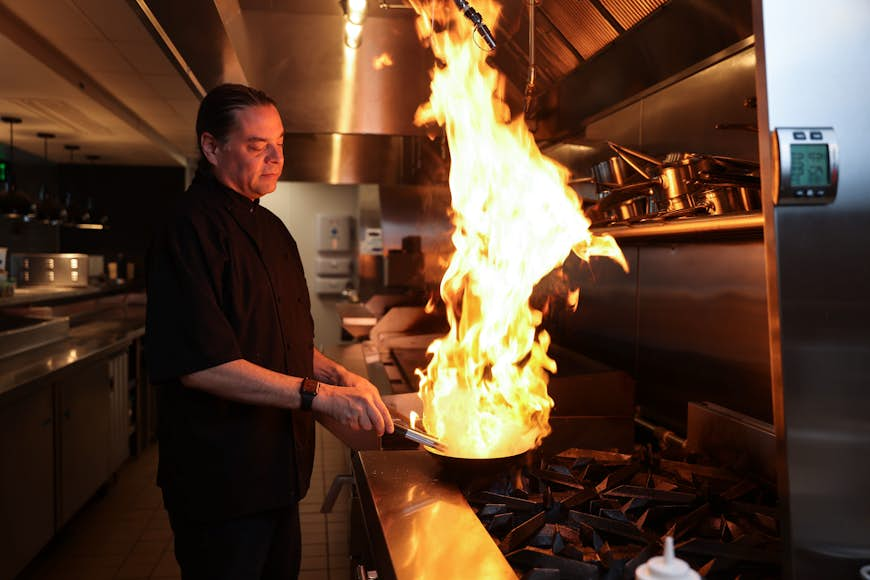At Owamni by The Sioux Chef, Sean Sherman and his team are redefining what “local” means through the lens of Native American tradition.
Editor’s Note: On June 13, 2022, Owamni by The Sioux Chef won the 2022 James Beard Award for Best New Restaurant. Some of the details of this story have been updated to reflect the award.
Restaurants weren’t a big part of Sean Sherman’s childhood on Pine Ridge Reservation in South Dakota. Though roughly the size of Connecticut, Pine Ridge had no restaurants at all when Sherman was growing up there, he says. There was also only one grocery store. This all changed soon after Sherman moved to the town of Spearfish when he was 12. Within a year, he began washing dishes and bussing tables at a local steakhouse. Restaurants have been a staple throughout Sherman’s life ever since.
Today, Sherman has been in the food industry for more than 30 years, with stints at restaurants through high school and college, eventually cooking French, Spanish, Japanese and other cuisines as a chef in Minneapolis. It wasn’t until around a decade ago though that he had an epiphany about his work. Sherman, a member of the Oglala Lakota tribe, realized that while he could easily name hundreds of European recipes off the top of his head, he knew very little about Lakota recipes. When he searched online, he also saw very few Native American restaurants and cookbooks.
“It was obvious that Indigenous foods and Indigenous peoples were just so largely invisible to the culinary world, even though we’re in America, in North America, and no matter where we are there are Indigenous peoples and history all over the place,” he said. “I just really wanted to understand what are true Indigenous foods and what does that even mean in today’s world.”
Indigenous cuisine revitalization: best places to sample traditional foods
Revitalizing tradition
The revelation prompted Sherman to begin reconnecting with Indigenous foods and traditions. He spoke with family elders, pored through history books, learned how to identify wild plants and cooked. In 2014 Sherman launched The Sioux Chef, bringing on board Dana Thompson, who became his business partner. Originally a catering company, The Sioux Chef now focuses on reclaiming and revitalizing Native American cuisine and food systems. In 2017, Sherman also released The Sioux Chef’s Indigenous Kitchen, a James Beard award-winning cookbook.

Last July Sherman’s career came full circle with the opening of the restaurant Owamni by The Sioux Chef, which serves modern Native American fare on the Mississippi River in Minneapolis. The foodies of the world noticed quickly: the restaurant won the 2022 James Beard Award for Best New Restaurant.
“We’re really not here to make a profit,” Thompson said. “Our main mission is to employ people, to build Indigenous entrepreneurs, to get these foods back into the mouths of people, to normalize Indigenous foods. That’s paramount. So this restaurant is just this massive labor of love.”

A new definition of “locally sourced”
Owamni joins a handful of Indigenous-owned restaurants across the United States focused on Native or Native-inspired cuisine, such as Tocabe in Denver, Colorado and Wapehpah’s Kitchen in Oakland, California. The overall lack of Indigenous restaurants though, both Sherman and Thompson agree, can be traced to the traumatic history of colonization and injustice in North America, which has not only led to a loss of Native land and ancestral wealth, but also knowledge, including culinary traditions.
“These foods were systematically removed by forced assimilation and genocide and the culture was almost erased. The fact that we have these foods here is an act of resistance itself,” said Thompson, whose mother is of Dakota ancestry. When their Owamni customers try their dishes, they’re doing much more than satiating their hunger, she says. “They’re literally absorbing culture.”
8 places to honor Native American heritage in the US

With 574 federally recognized Indian tribes, there’s no one Native American cuisine. Owamni’s menu includes Indigenous foods from across North America, with a focus on those of the Dakota tribe, which is based in the region. The restaurant takes a “decolonized approach” to its dishes, avoiding cane sugar, wheat, dairy, beef, chicken, pork and other ingredients not originally from North America. Instead, they feature foods such as game, fish, birds and insects as well as wild plants and Native American heirloom farm varieties. Owamni also tries to buy ingredients from Indigenous and local food producers and source wine and beer from Indigenous, BIPOC and female brewers and winemakers.

Not a single Coca-Cola in sight
The resulting menu, which features modern interpretations and dishes of Indigenous foods, naturally lends itself to a variety of diets, including gluten-free, dairy-free and pork-free. Owamni currently offers a fixed-price tasting menu for $85, with options that range from venison tartare and bison tripe and oxtail soup to wild rice dumplings and black bean cake with maple crickets. Sherman says they make their dishes with very specific regions in mind, half-joking that Owamni is probably one of the only restaurants in Minneapolis without Coca-Cola products or Heinz ketchup on the tables.
“We just really try to take an approach of trying to pay homage and respect to our Indigenous ancestors by identifying a lot of modern-day Indigenous ingredients and creating a new era of what is modern Indigenous food,” he said. “We just happen to be extremely healthy, because all these Indigenous foods are medicine to us as Indigenous peoples and you feel it when you eat it.”
11 Indigenous-owned hotels in the US and Canada

Despite launching during the pandemic, Sherman says Owamni has been booked solid every evening since opening day. It has also received lots of accolades besides the James Beard Awards recognition, making it onto numerous lists of the best restaurants of 2021. Sherman says it’s not unusual for customers to fly across the country and sometimes even from overseas to eat there. On Yelp, where Owamni has a 4.5-star rating, some customers are also raving.
“I’ve never had Indigenous food, or even really thought about where my food comes from. Eating at Owamni was both a delightful culinary experience, as well as a humbling reminder on what we owe to the Indigenous people here and before,” wrote one reviewer on Yelp.
Another reviewer said: “I was able to eat delicious food, left full and happy and had energy afterward. This is how food should make us feel. As a Lakota myself I tip my hat to you as you are an inspiration.”
Top 8 parks to escape the bustle in Minneapolis

About 80 people were hired when Owamni opened, of whom Sherman says over 70 percent identify as Indigenous. One of those people is Kareen Teague, the restaurant’s general manager and bar program coordinator. He says that although he’s worked in various restaurants for over 12 years, Owamni offers him something new and unique.
“I used to work at a traditional Japanese restaurant and I was always in awe of the respect and passion the Japanese chefs had for working with their traditional cuisine. At Owamni, I feel connected to the food through my heritage,” Teague said, who has Anishinaabe heritage.
The 10 best museums in Minneapolis are where the Midwest meets the world

Paying it forward
In 2018 Sherman and Thompson founded North American Traditional Indigenous Food Systems (NāTIFS), a nonprofit trying to increase access to and knowledge of Indigenous food. Their goal is to create a new North American food system that generates wealth and improves health in Native communities through food-related enterprises, in part to counter the massive health disparities Native Americans face. At the heart of the nonprofit is the Indigenous Food Lab, a kitchen and training center that covers everything from plant and food identification to how to run a culinary business based on Native traditions and foods.
NāTIFS is also working with the United States Department of Agriculture to boost education on healthy cooking with Indigenous ingredients and foods available through the Food Distribution Program on Indian Reservations (FDPIR), which provides food to income-eligible households. Both Sherman and Thompson grew up on FDPIR foods, commonly called commodity foods, including powdered milk, blocks of cheese and canned beef.
The 17 best things to do in Minneapolis that don’t cost a cent

“I’ll never learn everything about Indigenous foods, but we’re setting up structures and systems to be able to preserve it and maintain it for the following generations,” Sherman said. “We envision eventually being able to drive across the US or anywhere in North America and having the option of Indigenous food businesses: to be able to stop there and to experience the immense diversity and culture and language and stories and food.”
